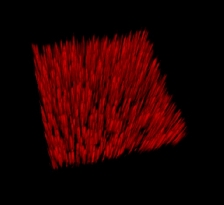Home > Press > Nano-forests to reveal secrets of cells
 |
| Nano-forest Photo: Aleksandra Dabkowska |
Abstract:
Vertical nanowires could be used for detailed studies of what happens on the surface of cells. The findings are important for pharmaceuticals research, among other applications. A group of researchers from Lund University in Sweden have managed to make artificial cell membranes form across a large number of vertical nanowires, known as a ‘nano-forest'.
Nano-forests to reveal secrets of cells
Lund, Sweden | Posted on September 2nd, 2014All communication between the interior of a cell and its surroundings takes place through the cell membrane. The membrane is a surface layer that holds the cell together and that largely comprises lipids, built of fatty acids. Inside the cell there are also various types of membrane, all with their own specific role.
Studies of cell membranes using nanotechnology have up to now mainly involved studying artificial membranes on flat surfaces, but because many membranes in the body have a curved shape, a different type of nano-surface is needed. In a new scientific study, researchers from Lund University have used vertical nanowires to create more varied surfaces on which artificial membranes can form. The Lund researchers have built an entire forest of upright nanowires on a one millimetre squared surface, on which they have succeeded in forming artificial membranes that are curved in the same way as many natural cell membranes.
"Our research demonstrates that artificial membranes can follow the curved surface formed by the nanowires, which creates unique opportunities to study membranes in a curved state", said Aleksandra Dabkowska from the Department of Chemistry at Lund University.
The nanowires also act as fine feelers that can measure how the membrane works. For instance, the vertical nanowires can be used to study different proteins that are active in the body's cell membranes. Because of their barrier function on the surface of the cell, these proteins are the target of a range of different drugs. The nano-forest could therefore be of great importance for pharmaceutical research, as well as for basic cell research, partly because the nano-surfaces are very precisely controlled as regards the length, thickness and spacing of the nanowires, and partly because the nano-forest multiplies the total study surface compared with a flat nano-landscape.
The present study is a close collaboration between researchers within the Nanometre Structure Consortium at Lund University who come from the Divisions of Physical Chemistry and Solid State Physics at the faculties of Science and Engineering.
####
For more information, please click here
Contacts:
Aleksandra Dabkowska
46-462-228-148
Copyright © Lund University
If you have a comment, please Contact us.Issuers of news releases, not 7th Wave, Inc. or Nanotechnology Now, are solely responsible for the accuracy of the content.
| Related Links |
| Related News Press |
News and information
![]() Simulating magnetization in a Heisenberg quantum spin chain April 5th, 2024
Simulating magnetization in a Heisenberg quantum spin chain April 5th, 2024
![]() NRL charters Navy’s quantum inertial navigation path to reduce drift April 5th, 2024
NRL charters Navy’s quantum inertial navigation path to reduce drift April 5th, 2024
![]() Discovery points path to flash-like memory for storing qubits: Rice find could hasten development of nonvolatile quantum memory April 5th, 2024
Discovery points path to flash-like memory for storing qubits: Rice find could hasten development of nonvolatile quantum memory April 5th, 2024
Nanomedicine
![]() New micromaterial releases nanoparticles that selectively destroy cancer cells April 5th, 2024
New micromaterial releases nanoparticles that selectively destroy cancer cells April 5th, 2024
![]() Good as gold - improving infectious disease testing with gold nanoparticles April 5th, 2024
Good as gold - improving infectious disease testing with gold nanoparticles April 5th, 2024
![]() Researchers develop artificial building blocks of life March 8th, 2024
Researchers develop artificial building blocks of life March 8th, 2024
Discoveries
![]() Chemical reactions can scramble quantum information as well as black holes April 5th, 2024
Chemical reactions can scramble quantum information as well as black holes April 5th, 2024
![]() New micromaterial releases nanoparticles that selectively destroy cancer cells April 5th, 2024
New micromaterial releases nanoparticles that selectively destroy cancer cells April 5th, 2024
![]() Utilizing palladium for addressing contact issues of buried oxide thin film transistors April 5th, 2024
Utilizing palladium for addressing contact issues of buried oxide thin film transistors April 5th, 2024
Announcements
![]() NRL charters Navy’s quantum inertial navigation path to reduce drift April 5th, 2024
NRL charters Navy’s quantum inertial navigation path to reduce drift April 5th, 2024
![]() Discovery points path to flash-like memory for storing qubits: Rice find could hasten development of nonvolatile quantum memory April 5th, 2024
Discovery points path to flash-like memory for storing qubits: Rice find could hasten development of nonvolatile quantum memory April 5th, 2024
Interviews/Book Reviews/Essays/Reports/Podcasts/Journals/White papers/Posters
![]() Simulating magnetization in a Heisenberg quantum spin chain April 5th, 2024
Simulating magnetization in a Heisenberg quantum spin chain April 5th, 2024
![]() Discovery points path to flash-like memory for storing qubits: Rice find could hasten development of nonvolatile quantum memory April 5th, 2024
Discovery points path to flash-like memory for storing qubits: Rice find could hasten development of nonvolatile quantum memory April 5th, 2024
Nanobiotechnology
![]() New micromaterial releases nanoparticles that selectively destroy cancer cells April 5th, 2024
New micromaterial releases nanoparticles that selectively destroy cancer cells April 5th, 2024
![]() Good as gold - improving infectious disease testing with gold nanoparticles April 5th, 2024
Good as gold - improving infectious disease testing with gold nanoparticles April 5th, 2024
![]() Researchers develop artificial building blocks of life March 8th, 2024
Researchers develop artificial building blocks of life March 8th, 2024
|
|
||
|
|
||
| The latest news from around the world, FREE | ||
|
|
||
|
|
||
| Premium Products | ||
|
|
||
|
Only the news you want to read!
Learn More |
||
|
|
||
|
Full-service, expert consulting
Learn More |
||
|
|
||








